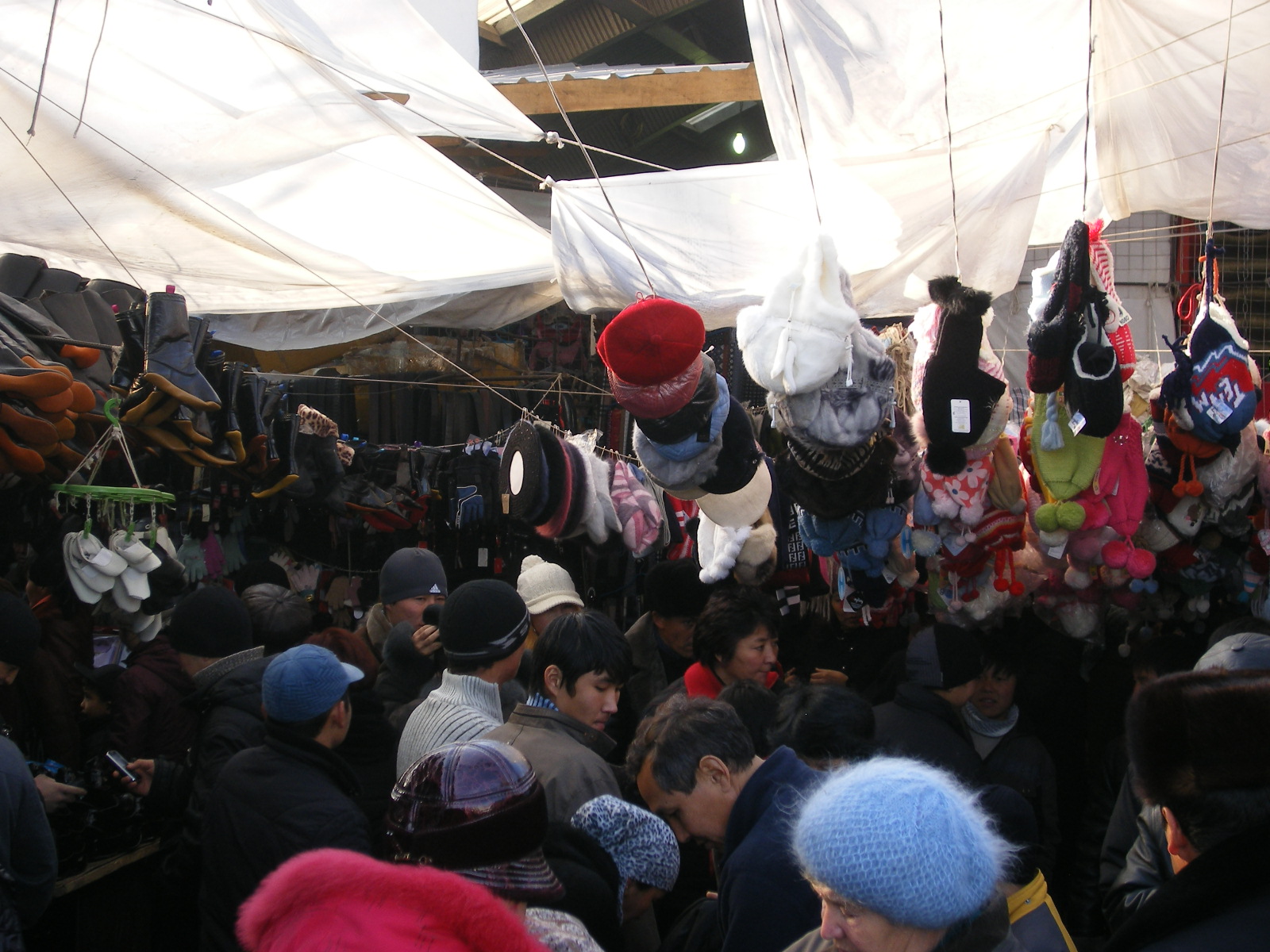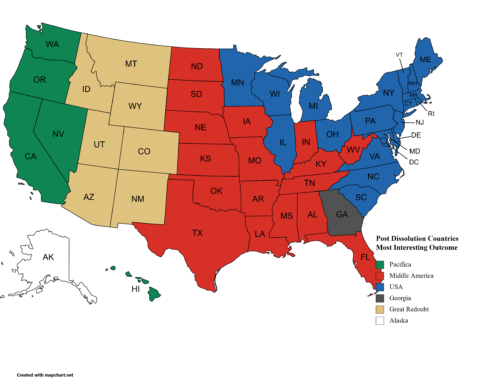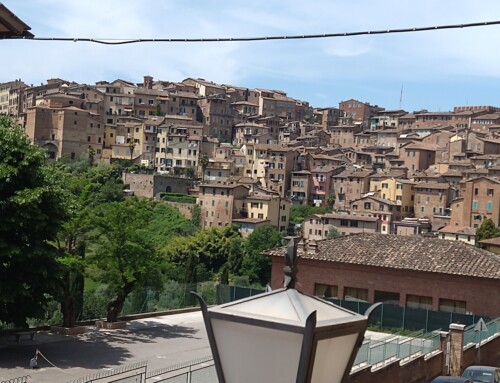Its always easy to look back and say, “Yeah, we should have seen that one coming…” Stunning how few people who were professionally studying the Soviet Union for a living saw its collapse. Yet all the signs were there. And the few who did see it coming were scoffed at. Funny how nobody found them and said, “Hey, sorry for scoffing you.”
Not everyone working on elements of the technology knew about the development of the smart phone, even if they knew the pieces and requisite capabilities existed. Those that were working on it likely knew only what their little piece of the pie did. Few could see that the the technology that made it possible to talk to one another on a mobile flip phone could enable group chats, swiping through pictures to decide who to go out with, and send a picture which a camera, on the same device, just took.
Humans have a tendency to think that because we didn’t do it, we wouldn’t do it. Or on the other hand, if we’re doing something now, we’ll keep doing it. Who predicted 10 years ago, when nearly everyone had a cell phone, that land lines would be all but obsolete from homes?
Few would have predicted in 2006 that a phone with a camera and internet connection would transform into a powerful life organizer whose phone became a rarely used app among hundreds of others on the device.
With that said, here are a few predictions on what we can look forward to in 10 years (with an occasions extension out beyond that). I thought about these not to be right or wrong, but because I think some issues that have profound implications for society are flashing red right now and wailing sirens to warn us that we need to take into account how we will deal with them as a society.
There is no sweepstakes here, and no attempt at surprise or pithiness. I’ll do my best to explain the predictions. Let me know if you think I am off the mark and why.
Societal trust will rapidly erode. Deep fake recordings will render all videos and pictures as suspect.
There was a time when photoshopping a picture was funny because of how obvious it was. Now programs exist that make fake videos that are so realistic they would pass a video Touring test. From LeBron James shooting full court jump shots to Nancy Pelosi stammering while speaking, these videos are pervasive. With CGI already able to make Robert DeNiro look 30 years younger and 2 years deceased Carrie Fisher pieced together from old video clips to create a realistic live person in Star Wars: The Rise of Skywalker, the technology will only get better.
This technology will have profound implications on trust, the fundamental bedrock upon which societies function. People will be quick to accept fake videos as real because they are used to images and videos being the currency of authenticity. But as they see how easily fakes are made and how reporting on fakes becomes part of news cycles, people will take the easy way out and question everything they see as suspect.
The implication of this lack of trust in images and videos is that people slowly begin to not accept as real that which is outside their personal experience. How will deep fakes affect the way people vote when fake videos of politicians cannot be told apart from real videos? How will news organizations decide on what to report when their vetting processes can’t tell a real video from a fake? What will happen in the justice system when videos and pictures will be summarily dismissed by defense attorneys and juries?
What will be affected beyond videos? If people cease to trust that what they see because it can be electronically manipulated, will people trust that their electronics in their car won’t be hacked and manipulated, or their phones to show they were really somewhere they weren’t?
I think we may see the societal mean for trust and relationships radically depart from the current practice of putting everything about your life on line and chasing after what other people are supposedly doing to a much smaller circle of genuine relationships maintained face-to-face through personal contact and concentric circles of trust becoming venn diagrams of overlapping circles between people and groups, much like the world was before the explosion of information technology.
On the other hand, I think we will see the rise of an attempt at some form of a trust economy, perhaps with trust scores being given to people who interact with each other. Of course, this kind of economy is just as vulnerable to manipulation and black market as any other, but I do think that those who are already working on aspects of this kind of trust currency will gain traction in the coming decade.
One final note on trust. Complete polarization is not the societal norm. Throughout history, there have been people on the extremes of the left-right political spectrum. However most people clustered near the middle, straddling the line one side or the other. Mass information and social media have enabled people to self-select on what information they want to consume in opposition to the previous model of being fed a stream of information from one of a few news outlets. Prior to that, people learned what happened in the world when people from outside their small town came through.
Today, there are forces who desire and actively work to purposely polarize populations. And the largest of these forces are countries that benefit from other countries not being unified. In the case of the Western countries, that means primarily Russia as well as China. Russian state-sponsored troll farms are busily at work influencing the US and European countries’ populations to push them out of the middle and to the extremes. When the people fight amongst themselves, they don’t unify against an outside potential threat. When people who 20 years ago saw Russia as an existential threat today see Russia as an agent of good, then we may be beyond the point of recovering the middle ground.
We will live in a surveillance state. Government and corporate control over personal location and browsing information will drive a large portion of the population off social media and drive others in a spiral of encryption
I say we will live in a surveillance state because were not quite all inside that box yet. But we will be soon. For many people, much of their lives are already within that surveillance box. If you happen to live in London, there are few places in the city not covered by security cameras. In Singapore, hotels using facial recognition software for checking customers into the hotel are sharing that information with their customs authorities which means they can track people and know when they’ve left the airport and arrived at their hotels as well as their activities in their rooms.
And then there’s China, where the state puts up pictures of Jaywalkers on large stadium style billboards and monitors to shame miscreants. Where fines are sent directly to your phone by text for violations. Now in China where you live and how much interest you pay on a loan is determined by your social credit score. That score is determined by how well you follow what the state says you should be doing.
And how far are we from such a system in the West? Well, if we look at it objectively, people are clamoring to adhere to the latest norms as dictated by “influencers” on social media. The advertisements you see today on your mobile device are specifically targeted to you based on your preferences as determined by your own online history. Many shows and movies produced for television, streaming and the cinema are increasingly targeted to narrow groups based on known interests as determined by the media companies.
Your devices are only becoming more interconnected and are gathering more information about you by the minute. From your vital signs taken by your connected watch, to what food is in your fridge, to who is in your home as seen by your doorbell cameras. But most importantly, the tracking devices we all carry in the form of phones leave a trail of activity that is not deniable unless you work very hard to actively cover your tracks by using burner phones and maintaining no online presence.
But data analytics today even removes the ability to hide by using burner phones. Technology exists today to track a person through his or her device, to determine their rest locations (homes, hotels, etc), their meeting locations as determined by the proximity of other signals near the target. From there it is possible to build out an entire network of relationships and associations.
This is not some spy movie fictionalized plot enhancement. This is real world technology being used by real people. Many work with this technology in the support of noble ends, such as determining the extent of terrorist associations and finding people who have been kidnapped and trafficked. But what happens when you, as a real person with no criminal record or nefarious associations come under surveillance because you were three degrees removed from a person that is under suspicion of some nefarious act. And without knowing it, your entire contacts are searched and added to surveillance, because after all, you were within 3 degrees of separation from someone you don’t know but who is under suspicion. See, someone has to be the deciding authority on how many degrees of separation constitute due diligence for the purposes of investigating nefarious networks. We didn’t find Osama bin Laden because someone walked in off the street and gave up that information. It was network associations that led to him.
Likewise today, no bureaucrat will say that one degree of separation is sufficient to contain a terrorist network when it is possible that someone 3 degrees away could be involved through intermediaries. Especially if that bureaucrat could be blamed for the decision of how many degrees is sufficient if some commission determines after an attack that more could have been done if the search parameters had been broader from the beginning.
Which brings me to the implications of this prediction. There will be an increasing proportion of people in society who decide that they do not want other people in corporations or the government to know where they are, who they talk to and where they go to recreate. They will decide to increasingly disconnect from social media and devices that can present a picture of who they are and who they talk to. For some this will be a way to protect themselves from getting innocently caught in someone else’s 3 degrees of contacts surveillance. For some, this will be a way to protect their friends and relatives from surveillance. For others, this will be a middle finger raised to the government in a show of defiance.
Those who disconnect will come from all political persuasions and from all age groups, but with a higher proportion coming from those who are between 20 and 55 today. Those who are older will be more likely to say they have nothing to hide and aren’t worried because they have done nothing wrong. Those younger than 20 today will likely have had little, if any experience without smart technology in their lives and will not know anything else. They accept any terms and conditions placed before them today and may not even care about, let alone try to understand the risks that come with downloading that app or watching that stream.
But what happens when the norm in a society is full awareness of a person’s online identity and activity? It means that deviation from that norm becomes suspect. So the persons who don’t want the government to know what they are doing are self-identifying as someone worthy of further surveillance since, obviously, in this new era, only someone who has something to hide would not want to be surveilled. It is terrible logic, but that will be the logic used by governments. Having been asked by federal investigators why I don’t use Facebook and what I could possibly have to hide by staying off social media, I can tell you that for most of us, that time is already here.
And for those who say technology will always allow a back and forth between those who are hiding their information and those who are trying to uncover it. Won’t this continue? Quantum computing may allow the government or anyone who can afford it to hack any encryption. But what won’t change is that cell phones will always store and send location data based on communicating with cell towers, which will always be readily available.
And that is not to mention China…
The Middle Class will shrink to even smaller proportions of the population
The last 75 years have been an outlier in human history. Since the middle ages there has been a middle class in most of Western Civilization. But that middle class was not vast. It was not as wealthy as the nobility, but it was certainly better off than the large majority of the working poor. That model held fast until the end of WWII in the US. After WWII, the US (and to a lesser degree, Canada) was the only major industrialized country in the world not devastated by the war. 80% of all buildings were destroyed in German cities. It was the same in other European countries. Same in Japan and China. So when the already charged US production economy took off in even a higher gear, American workers received higher pay and fueled a production economy that was unlike any other in history.
In no other time or place in history could workers with a minimum of education earn a wage that could support a growing family at middle class levels and then earn a lifetime pension after retiring. This was truly unprecedented. And it came to be expected. And when such benefits actually bankrupted companies and cities who owed far more to non-working pensioners than their intakes in revenues, there was an outcry against treatment of workers and pensioners.
What we are seeing is a natural readjustment to wages based on what competitive economies can support given that the US is no longer 50% of the global economy as it was immediately after WWII. As we move forward a decade, I predict the middle class will shrink, the wealthiest strata will remain the nobility and the working class will increase in proportion to the population. The American Dream of a home and yard and easy job and long retirement paid by a pension may be possible, but it will only be so for those who put money away aggressively in retirement accounts or to those who sign up for the diminishing number of government jobs that provide (ever-decreasing) pensions, such as military service or first responders.
There will be major demographic changes around the world
As the proportion of the global population living in abject poverty diminishes and as the global south industrializes, the population will level off and start declining. We will see the trend line in population start to level off in most places of the world by the end of the decade as fewer people farm the land and need multiple children to help farm the land, and as infant mortality rates fall around the world.
For some countries, like Japan, whole regions of the country will empty with a few farmers remaining behind to provide food to ever centralizing urban centers. In Russia, the population is declining rapidly and Russia has almost no immigration. Putin is actively seeking to end legalized abortion as a way to stabilize the population. A country that produces fossil fuels and weaponry will see fewer and fewer people to protect.
In Western Europe, immigration has slowed dramatically as the demographic realities became apparent in the last decade. Countries based on ethnicity and language, which is just about all of Europe, saw their native populations drastically decline while immigrant populations continued to increase. This demographic divide will deepen as those of immigrant descent who remain will increasingly demand a voice in governance against a native population who feels increasingly beset upon within their own country.
The political implication will be a trend towards nationalism and illiberalism where older populations will vote for illiberal nationalists and younger voters will oppose them until they can gain a majority through death of the previous generations.
We will also see a continued great migration into cities, and increasing number of which will be considered mega-cities. There will be some people who move from large cities to smaller cities or rural areas, but the trend will definitely push cities to importance such that governments will be unable to not prioritize their needs.
This means that governments that have in the past politely separated mega-cities that demand water from several thousand farmers that demand the same water will be unable to separate them politely any longer. State and national governments will have to make difficult decisions and the representatives of city dwellers will see to it as they will dominate legislatures.
This truth will give rise to a trend in the next decade that will have implications well beyond the decade, and that is the strength and power of cities as well as their inherent weakness. The power will come from the political clout they have with large voting populations and the purchasing power of their people to directly negotiate with food and services providers. Their vulnerability will be that they will be initially dependent on food and services providers.
That will change as cities begin to consider alternatives to traditional models of food production and distribution as well as energy production and waste management. As cities innovate with food production in vertical buildings, rather than relying on farmers on the plains, food production will be increasingly controlled by city governments as will energy production.
In the long term, the necessary implications of global urbanization will be that cities will have distinct characteristics and that they will come to dominate political polities to the extent that we may see city republics as in the days of Genoa and Venice, with their own independent governments and trade arrangements geared around their interests.
We will also see in this decade a pressure from people in the global south to move not only to cities within their countries, but to other countries with more potential opportunity than they have. And this migration will put a strain on governments of the wealthy North to make moral decisions about sovereignty. Will smaller wealthy countries be willing to use force to keep mass migrations of people out to maintain ethnic majorities? Will it be possible?.
There are enough resources in the world for all its people. Those resources are just not spread out where all the people currently live. So will Chinese people continue to walk across frozen rivers in winter into empty Russian territory and settle where there is more land, and will Russia tolerate that migration if it increases? Will white European countries use force to stop waves of walking masses in search of service jobs, which are readily available in European cities?
I think that this next decade will see at least one, if not several large potential waves of people peacefully, and perhaps wretchedly, walking to countries which the masses think have opportunities that their impoverished homes don’t have. I think that border fences and force will not work on a practical scale. I predict moral political arguments will lead to compromises such as wealthy countries committing to and actually sending material aid to help the poor countries better their situations so as not to deal with the refugees in their own countries.Those resources will be spent, whether on barriers and border security and detention or in the countries that most need it.
So what did I get wrong about this. Lets not bring up all the predictions I didn’t make. I think four is enough for healthy discussion and a look back after 10 years to measure against the evidence of history.
Keep thinking…






Tom, I share most of your analysis. Would add a few thoughts.
Through using social media we already learned that we need to find new ways to TRUST WORDS…. Since ‘outrageous stories’ often times have more reach, AI will be able to fake movies and put language in any mouth thus we need to find new ways to TRUST PICTURES (already) but also subsequently MOVIE files. What happened if someone right now manipulated a Trump speech by putting fake words in his mouth which would escalate a political situation …… ???
Then there is the danger of SURVEILLANCE dictatorship due to big data. The algorithm might know more about myself than I do. This opens the door to manipulation big time. We need to find ways to TRUST ourselves in a new way. What if we fall in love but the algorithm predicts that this is not the right person ….. (and the algorithm has a very high proven level of reliability)? Who will we TRUST ??
The biggest INFLUENCER right now is MONEY ….. the dependence on data creates new more intense impact of MONEY and danger of manipulation …. What could balance the dependence on MONEY as the key driving force…?
SURVEILLANCE can also lead to a new meaning what AUTHENTICITY could do ….. could be AUTHENTICITY the best firewall….. do we need to develop a more flexible way to deal with ’embarrassing’ data which is stored in our history…… ? it may lead also to a deeper sense of humanity and could be a chance.
MIDDLE CLASS is currently shrinking in USA versus grows in China and many developing countries. There will be another momentum coming through AI and digitalization which might eliminate or at least modify jobs which are more mechanical in nature…… including my own (Radiologist) … but will make other jobs more valuable such as nursing or teachers which are not easily replaceable. Even some conservative market economists suggest that we might need a basic guaranteed income. …. to provide the means for necessities but also for possible shift of workforce towards more soft skills….. which might be a boost for humanitarian work ….
Based on the demographics there will also be an increase of migration…. which could be an essential for survival of some of the aging societies and create new needs to TRUST others with different cultural backgrounds.
Bottomline: TRUST seems to be at the center in a world where we will be challenged in new ways to trust our own instincts, to trust others in word and picture/movie. The demographic change and expected migration will lead to another challenge who we need to TRUST. Societies are loosing rituals and MONEY as the dominant narrative will be even more dominant and requires a narrative which can balance it to create room for humanity. How we overcome with these developments will depend on how we can overcome the TRUST challenge coming with it…..
Bhutan has ‘happiness’ as a national goal …. with its own department and secretary of happiness. Likely we will need an organizer – similar to the the central banker – independent of government and monetary constraints – who will regulate TRUST. I make the case for a currency of TRUST.
cheers
mh
http://www.trustos.org
[…] say that we are concerned about the near future of our country is an understatement. Back in January, we wrote a piece with some specific predictions for 2030. We think those predictions are still sound, but we think some of them will accelerate. What we […]
[…] who now lives in small-town Kentucky. He refers to a “What to Expect in 2030” forecasting article he wrote just before the pandemic, and argues that the pandemic has made one of its elements more […]
[…] strategist who now lives in small-town Kentucky. He refers to a “What to Expect in 2030” forecasting article he wrote just before the pandemic, and argues that the pandemic has made one of its elements […]